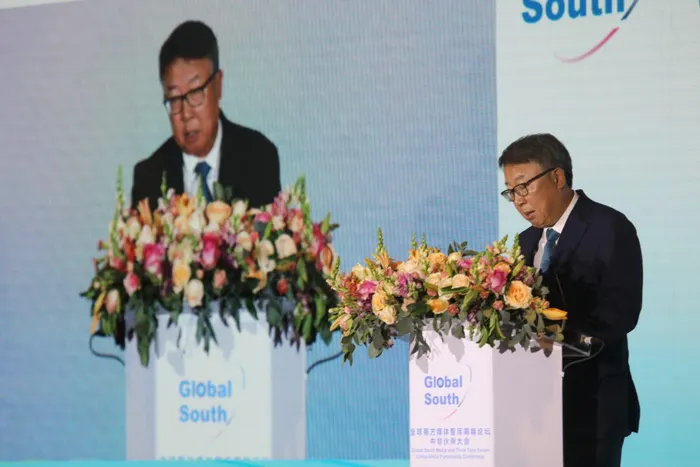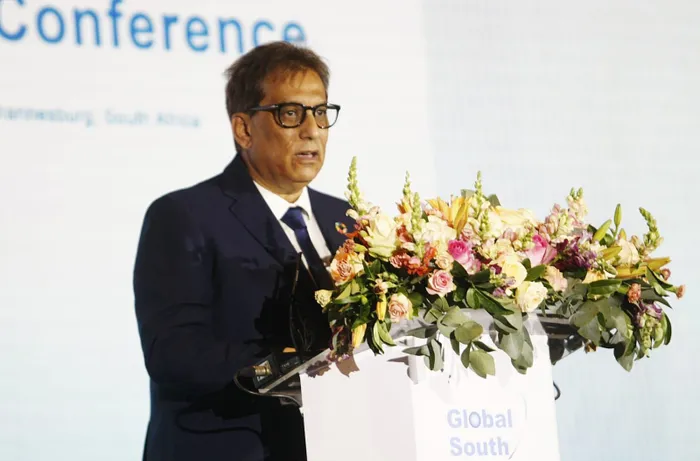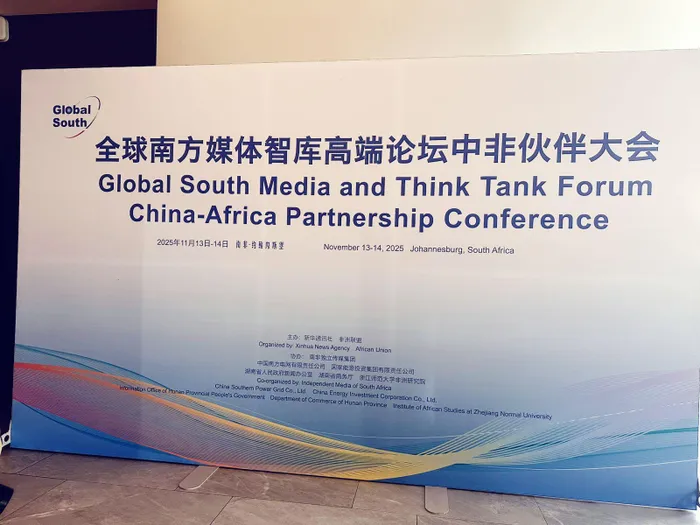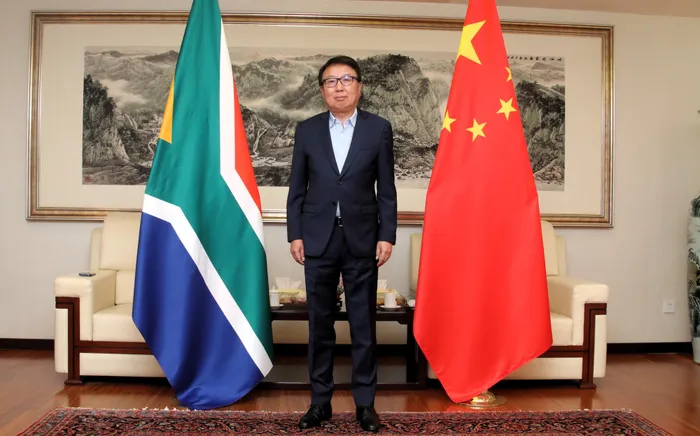
Chinese Ambassador to South Africa Wu Peng addresses the Global South Media Think Tank High-Level Forum and China-Africa Partnership Conference in Johannesburg.
Image: Timothy Bernard/ Independent Media
The Ambassador of the People’s Republic of China to South Africa, Wu Peng, on Thursday addressed the Global South Media Think Tank High-Level Forum and China-Africa Partnership Conference in Johannesburg, where he hailed the “remarkable rise of the Global South” as one of the defining features of the modern era.
The event was attended by key panelists including the Chairman of Independent Media and co-chair of the BRICS Media Forum, Dr Iqbal Survé; Executive Mayor of the City of Johannesburg, Dada Morero; Consul General of China in Johannesburg, Pan Qingjiang; and Lv Yansong, Editor-in-Chief of Xinhua News Agency.

Chairman of Independent Media and co-chair of the BRICS Media Forum, Dr Iqbal Survé
Image: Timothy Bernard / Independent Media
“Today, the Global South accounts for over 40% of the global economy and contributes 80% to global economic growth. It has become a key force in safeguarding global peace, driving global development, and improving global governance,” Wu told hundreds of delegates, including members of the media, academia, and think tank representatives from China and Africa.
“As the world’s largest developing country and the continent with the most developing nations, China and Africa share a similar history of anti-colonialism and anti-hegemony, as well as a common mission of development and revitalization,” he said.
Wu described China and Africa as "natural members and the backbone" of the Global South.
"China and Africa account for one-third of the world’s total population. Without the modernization of China and Africa, there can be no modernization of the world,” he added.
Turning to China-Africa cooperation, Wu recalled the Forum on China-Africa Cooperation (FOCAC) Summit held in Beijing last September, where bilateral relations between China and African countries with diplomatic ties to Beijing were elevated to the level of strategic relations.
“The overall characterization of China-Africa relations has been elevated to an all-weather China-Africa community with a shared future for the new era. The China-Africa relationship is now at its best in history,” he said.

The Global South Media Think Tank High-Level Forum and China-Africa Partnership Conference is under way in Johannesburg
Image: Jonisayi Maromo/ IOL
Looking ahead, Wu emphasized that China would continue to prioritize closer unity and cooperation with African countries.
“No matter how the international situation changes, and no matter how far China develops, we will remain Africa’s most sincere friend and most reliable partner,” he said.
Wu underscored “practical cooperation” as a defining feature of the China-Africa partnership.
“China and Africa will jointly implement the Belt and Road Initiative, align the Global Development Initiative with the African Union’s Agenda 2063 and the development strategies of African countries, and further advance China-Africa cooperation,” he said.
He noted that in the 25 years since FOCAC’s establishment, China-Africa trade has grown 27-fold, while China’s investment in Africa has increased more than 80 times.
China, he said, has helped African countries build or upgrade nearly 100,000 kilometres of highways and more than 10,000 kilometres of railways.
"In the past three years alone, Chinese companies have provided more than 1.1 million jobs in Africa," said Wu.
“In June this year, President Xi Jinping announced that China is ready to grant zero-tariff treatment on 100 percent of tariff lines for 53 African countries that have diplomatic relations with China, through agreements on economic partnership for shared development.
“Against the backdrop of rising unilateralism and protectionism, China’s measures reflect the mutually beneficial nature of China-Africa cooperation. We stand ready to work with South Africa for faster implementation of the zero-tariff policy, allowing more high-quality South African products to enter the Chinese market under more favourable conditions," he said.
The former Chinese ambassador to Kenya also touched on the global context, warning that the world was facing multiple overlapping risks and challenges.
“The world today is not peaceful. Multiple risks and challenges are overlapping, and new shocks are threatening world peace and development,” he said.
“Under these new circumstances, China is ready to work with African countries to implement the outcomes of the FOCAC Beijing Summit, further expand win-win cooperation across all fields, and accelerate the common modernization of China and Africa.
“We should deepen solidarity and cooperation, jointly advocate multilateralism and safeguard the international system with the United Nations at its core, promote trade and investment liberalization and facilitation, and inject more stability and positive energy into the world.”
Wu arrived in South Africa last year, where IOL was granted the first opportunity to sit down with the affable former director-general of China’s Department of African Affairs in the Foreign Ministry, just days after he took the reins at the Embassy of China in South Africa.

China’s Ambassador to South Africa, Wu Peng, during a previous interview with IOL.
Image: Supplied
As the Global South continues to assert its influence on global economic and governance platforms, gatherings such as the Global South Media Think Tank High-Level Forum highlight efforts by China and Africa to redefine development partnerships beyond aid.
For Beijing, the deepening ties reflect both strategic and economic ambitions, while for African nations, the relationship continues to offer infrastructure, trade, and employment opportunities — albeit amid ongoing debates about balance and mutual benefit.
jonisayi.maromo@iol.co.za
IOL News